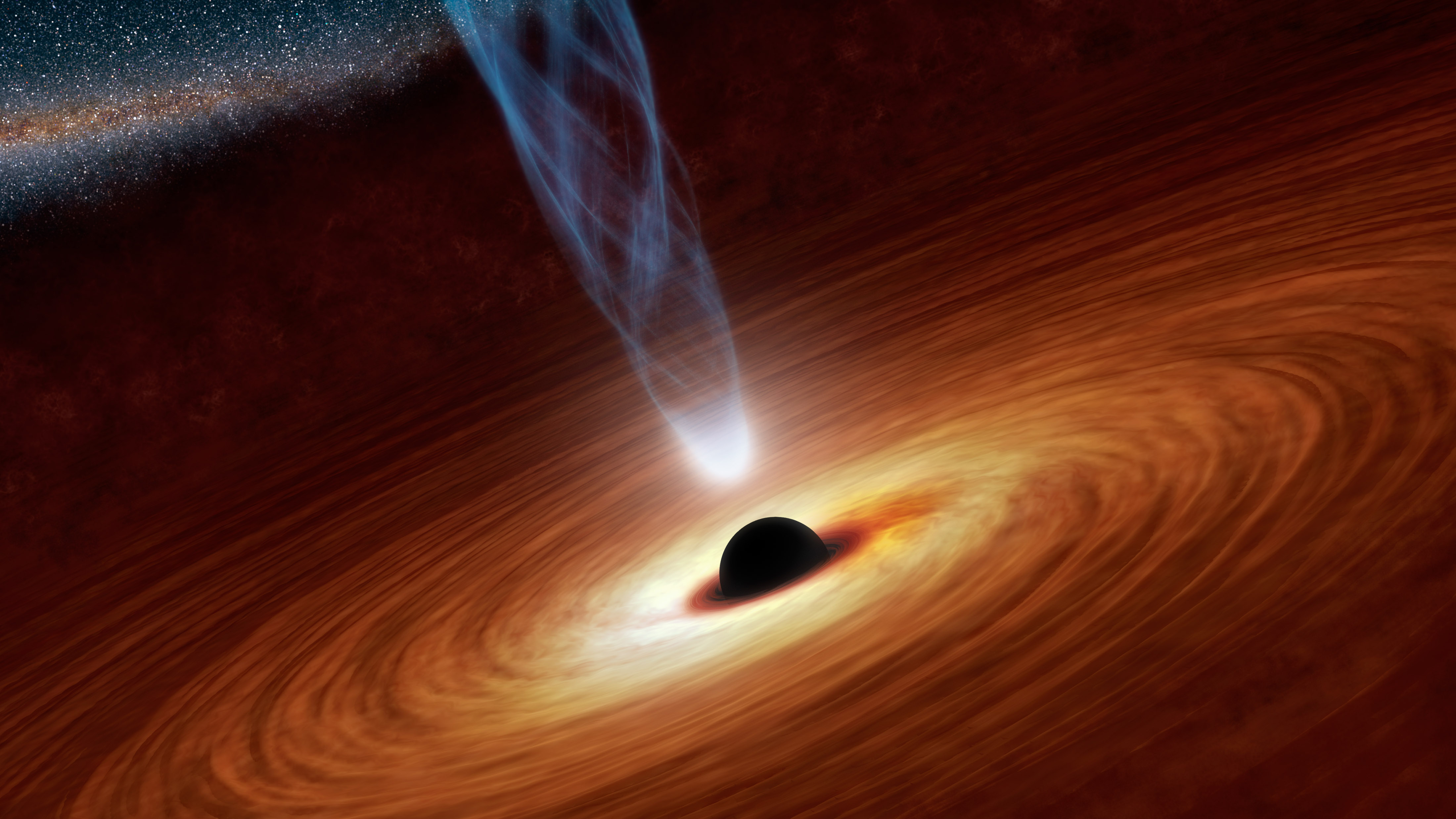We reach more than 65,000 registered users in Dec!! Register Now

Scientist discovered giant black hole trio spiraling into each other
- June 28, 2014
- 850 Views
- 0 Likes
- 0 Comment
As≠tro≠no≠mers say they have de≠tected three gi≠ant black holes spi≠ral≠ing in≠to each oth≠er. They're hop≠ing si≠m≠i≠lar sys≠tems could give off de≠tect≠a≠ble "rip≠ples" in space and time of a type pre≠dicted by Ein≠stein. Scientists ex≠am≠ined six sys≠tems thought to con≠tain two "su≠per≠mas≠sive" black holes. A black hole is an ob≠ject so com≠pact ...
As≠tro¬≠no¬≠mers say they have de¬≠tected three gi¬≠ant black holes spi¬≠ral¬≠ing in¬≠to each oth¬≠er. They're hop¬≠ing si¬≠m¬≠i¬≠lar sys¬≠tems could give off de¬≠tect¬≠a¬≠ble ‚Äúrip¬≠ples‚ÄĚ in space and time of a type pre¬≠dicted by Ein¬≠stein.
Scientists ex¬≠am¬≠ined six sys¬≠tems thought to con¬≠tain two ‚Äúsu¬≠per¬≠mas¬≠sive‚ÄĚ black holes. A black hole is an ob¬≠ject so com¬≠pact that its gra¬≠vity over¬≠pow¬≠ers even light. Su¬≠per¬≠mas¬≠sive black holes are a mam¬≠moth type, which lurk at the cen¬≠ters of ga¬≠lax¬≠ies and an¬≠chor them to¬≠geth¬≠er.
The re¬≠search¬≠ers found that one of these con¬≠tained three su¬≠per¬≠mas¬≠sive black holes ¬Ė the tight¬≠est tri¬≠o of black holes de¬≠tected at such a large dis¬≠tance ¬Ė with two of them or¬≠bit¬≠ing each oth¬≠er rath¬≠er like bi¬≠na¬≠ry, or dou¬≠ble stars. The find¬≠ing sug¬≠gests that these closely packed su¬≠per¬≠mas¬≠sive black holes are far more com¬≠mon than pre¬≠vi¬≠ously thought, the sci¬≠en¬≠tists said. A re¬≠port of the re¬≠search is pub¬≠lished in this week's is¬≠sue of the jour¬≠nal¬†Na¬≠ture.
‚ÄúWhat re¬≠mains ex¬≠tra¬≠or¬≠di¬≠nary to me is that these black holes, which are at the very ex¬≠treme of Ein¬≠stein's The¬≠o¬≠ry of Gen¬≠er¬≠al Rel¬≠a¬≠ti¬≠vity, are or¬≠bit¬≠ing one anoth¬≠er at 300 times the speed of sound on Earth,‚ÄĚ said Rog¬≠er Deane from the Uni¬≠vers¬≠ity of Cape Town in South Af¬≠ri¬≠ca, who led the proj¬≠ect.
‚ÄúNot only that, but us¬≠ing the com¬≠bined sig¬≠nals from ra¬≠di¬≠o tele¬≠scopes on four con¬≠ti¬≠nents we are able to ob¬≠serve this ex¬≠ot¬≠ic sys¬≠tem one third of the way across the Uni¬≠verse,‚ÄĚ he added. The dis¬≠tance is es¬≠ti¬≠mat¬≠ed as four bil¬≠lion light-years. A light-year is the dis¬≠tance light trav¬≠els in a year.
‚ÄúThis is just scratch¬≠ing the sur¬≠face of a long list of dis¬≠cov¬≠er¬≠ies that will be made pos¬≠si¬≠ble with the Square Kil¬≠o¬≠me¬≠ter Ar¬≠ray,‚ÄĚ a new tel¬≠e¬≠scope sys¬≠tem, he added.
The ex¬≠pecta¬≠t¬≠ion is that such black holes would eventually merge, giv¬≠ing off these waves pre¬≠dicted by Ein¬≠stein. ‚ÄúThe idea that we might be able to find more of these po¬≠ten¬≠tial sources of gravita¬≠t¬≠ional waves is very en¬≠cour¬≠ag¬≠ing as know¬≠ing where such sig¬≠nals should orig¬≠i¬≠nate will help us try to de¬≠tect these ¬Ďrip¬≠ples' in space-time as they warp the Uni¬≠verse,‚ÄĚ said as¬≠t¬≠ro¬≠phys¬≠i¬≠cist Matt Jarvis of Ox¬≠ford Uni¬≠vers¬≠ity, a co-author of the pa¬≠per.
‚ÄúWe have man¬≠aged to spot three black holes packed about as tightly to¬≠geth¬≠er as they could be be¬≠fore spi¬≠ral¬≠ing in¬≠to each oth¬≠er and merg¬≠ing.‚ÄĚ
The team used a tech­nique called Very Long Base­line In­ter­fer­om­etry to dis­cov­er the in­ner two black holes. This tech­nique com­bines the sig­nals from large ra­di­o an­ten­nas sep­a­rat­ed by up to 10,000 kilo­me­ters (6,200 miles) to see de­tail 50 times fin­er than that pos­si­ble with the Hub­ble Space Tel­e­scope. Fu­ture ra­di­o tele­scopes are ex­pected to be able to meas­ure the gravita­t­ional waves from such black hole sys­tems as the ob­jects fall in­to each oth­er.
The re­search­ers al­so found that even though black holes may be so close to­geth­er that our tele­scopes can't tell them apart, the twisted jets of par­t­i­cles that they give off may pro­vide easy-to-find point­ers to them, much like us­ing a flare to mark your loca­t­ion at sea. This could pro­vide sen­si­tive fu­ture tele­scopes a way to find such ob­jects more eas­i­ly.
![BlackHole[1]](http://machprinciple.com/wp-content/uploads/2014/06/BlackHole1-1024x819.jpg) Source : http://www.world-science.net/
Source : http://www.world-science.net/ 
Cite This Article as
No tags found for this post









